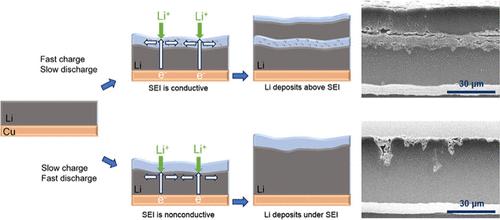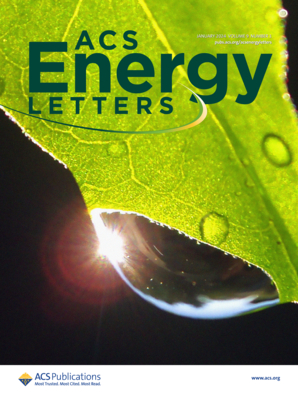Unveiling the Impacts of Charge/Discharge Rate on the Cycling Performance of Li-Metal Batteries
IF 18.2
1区 材料科学
Q1 CHEMISTRY, PHYSICAL
引用次数: 0
Abstract
Lithium metal batteries (LMBs) offer superior energy density and power capability but face challenges in cycle stability and safety. This study introduces a strategic approach to improving LMB cycle stability by optimizing charge/discharge rates. Our results show that slow charging (0.2C) and fast discharging (3C) significantly improve performance, with a multilayer LMB retaining over 80% capacity after 1000 cycles. Fast discharge rates promote lithium plating beneath the SEI layer, suppressing its growth and improving Coulombic efficiency, whereas slow discharge rates facilitate lithium plating above the SEI, leading to SEI accumulation. We propose a rational hypothesis linking SEI conductivity and cycling conditions and introduce an intermittent pulse discharge protocol to emulate electric vehicle applications, further improving the stability. These optimized cycling strategies enhance the LMB lifespan, utility, and safety, paving the way for broader market adoption in the years ahead.

揭示充放电速率对锂金属电池循环性能的影响
锂金属电池(lmb)具有优越的能量密度和功率能力,但在循环稳定性和安全性方面面临挑战。本文介绍了一种通过优化充放电率来提高LMB循环稳定性的策略方法。我们的研究结果表明,慢充电(0.2C)和快速放电(3C)显著提高了性能,多层LMB在1000次循环后保持了80%以上的容量。快速的放电速率促进SEI层下方的锂电镀,抑制SEI层的生长,提高库仑效率,而缓慢的放电速率有利于SEI层上方的锂电镀,导致SEI积累。我们提出了将SEI电导率与循环条件联系起来的合理假设,并引入了间歇性脉冲放电协议来模拟电动汽车应用,进一步提高了稳定性。这些优化的骑行策略提高了LMB的使用寿命、实用性和安全性,为未来几年更广泛的市场应用铺平了道路。
本文章由计算机程序翻译,如有差异,请以英文原文为准。
求助全文
约1分钟内获得全文
求助全文
来源期刊

ACS Energy Letters
Energy-Renewable Energy, Sustainability and the Environment
CiteScore
31.20
自引率
5.00%
发文量
469
审稿时长
1 months
期刊介绍:
ACS Energy Letters is a monthly journal that publishes papers reporting new scientific advances in energy research. The journal focuses on topics that are of interest to scientists working in the fundamental and applied sciences. Rapid publication is a central criterion for acceptance, and the journal is known for its quick publication times, with an average of 4-6 weeks from submission to web publication in As Soon As Publishable format.
ACS Energy Letters is ranked as the number one journal in the Web of Science Electrochemistry category. It also ranks within the top 10 journals for Physical Chemistry, Energy & Fuels, and Nanoscience & Nanotechnology.
The journal offers several types of articles, including Letters, Energy Express, Perspectives, Reviews, Editorials, Viewpoints and Energy Focus. Additionally, authors have the option to submit videos that summarize or support the information presented in a Perspective or Review article, which can be highlighted on the journal's website. ACS Energy Letters is abstracted and indexed in Chemical Abstracts Service/SciFinder, EBSCO-summon, PubMed, Web of Science, Scopus and Portico.
 求助内容:
求助内容: 应助结果提醒方式:
应助结果提醒方式:


